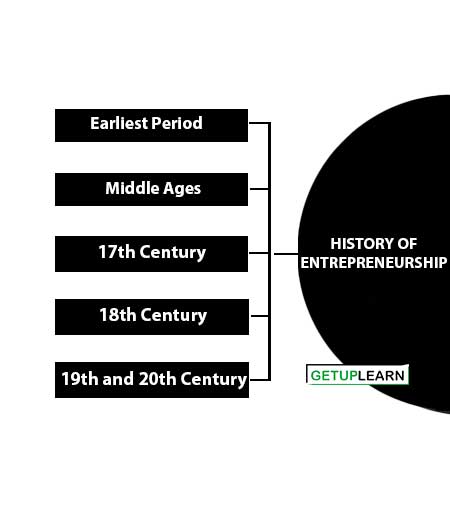Table of Contents
Meaning of Entrepreneurship
Entrepreneurship means the willingness of an individual to start a new business venture by taking risk and managing it in this technology enabled competitive global environment. The entrepreneurs are passionate to innovate, lead, invent or pioneer with a disruptive product or technology.
The size of the business, the type of work involved, the age or the formal education of the entrepreneur etc. does not restrict the entry of the entrepreneur. Similarly, the label of success or failure also does not matter. Entrepreneurs are the people who have the courage to offer and to share an idea or a product or a service with the world. They try to make market a better place where the needs of consumers can be satisfied.
Entrepreneurship is a process to willingly design, launch, develop, organize and run a new business venture along with its risk to make a profit and held in the growth of the economy. Entrepreneurship is described under both established firms and new businesses which have the ability to translate inventions or technologies into products and services. An entrepreneur is a person who creates a new business by identifying and collecting the required resources, by facing the risk and uncertainty for the purpose of achieving the desired profit and growth.
History of Entrepreneurship
In the early 16thcentury the term ‘Entrepreneur’ was used by Frenchman to denote men leading in military expeditions. Around 1700 A.D. the term was used in France for contractors or architects.
By the early 18thcentury the term was applied to Business and Economic activities by the French Economist Richard Cautillon, (Cantilon). In 1848, the famous economist John Sturt Mill described ‘Entrepreneurship’ as the founding of a Private enterprise. As far as India is concerned, several factors are responsible for the slow growth of entrepreneurship in pre independent India.
At the time of independence, the industrial base of our economy was very poor. The industries were facing many difficulties, like shortage of raw materials, shortage of capital, marketing problems etc. However, the Indian Government is considerably enhancing the ease of doing business.
Entrepreneurship is defined as the process of starting a business. Today, entrepreneurs are romanticized as being the cornerstones of a successful capitalist economy.But where did entrepreneurship begin? Who were the first entrepreneurs? In a global economy dominated by big businesses, what does the future hold for entrepreneurship? Today, we’re going to tell you everything you need to know about the history of entrepreneurship:
- Earliest Period
- Middle Ages
- 17th Century
- 18th Century
- 19th and 20th Century

Earliest Period
An early example of the earliest definition of an entrepreneur as a go-between is Marco Polo, who attempted to establish trade routes to the Far East. As a go-between, Marco Polo would sign a contract with a money person (forerunner of today’s venture capitalist) to sell his goods.
A common contract during this time provided a loan to the merchant–adventurer at a 22.5 percent rate, including insurance. While the capitalist was a passive risk bearer, the merchant–adventurer took the active role in trading, bearing all the physical and emotional risks.
Middle Ages
In the Middle Ages, the term entrepreneur was used to describe both an actor and a person who managed large production projects. A typical entrepreneur in the Middle Ages was the clerical person in charge of great architectural works, such as castles and fortifications, public buildings, abbeys, and cathedrals.
17th Century
Richard Cantillon, a noted economist and author in the 1700s, Cantillon developed one of the early theories of the entrepreneur and is regarded by some as the founder of the term. He viewed the entrepreneur as a risk taker, observing that merchants, farmers, craftsmen, and other sole proprietors “buy at a certain price and sell at an uncertain price, therefore operating at a risk.”
One entrepreneur in this period was John Law, a Frenchman, who was allowed to establish a royal bank. The bank eventually evolved into an exclusive franchise to form a trading company in the New World the Mississippi Company. Unfortunately, this monopoly on French trade led to Law’s downfall when he attempted to push the company’s stock price higher than the value of its assets, leading to the collapse of the company.
18th Century
In the 18th century, the person with capital was differentiated from the one who needed capital. In other words, the entrepreneur was distinguished from the capital provider (the present-day venture capitalist). One reason for this differentiation was the industrialization occurring throughout the world.
Many of the inventions developed during this time were reactions to the changing world, as was the case with the inventions of Eli Whitney and Thomas Edison. Both Whitney and Edison were developing new technologies and were unable to finance their inventions themselves.
Whereas Whitney financed his cotton gin with expropriated British crown property, Edison raised capital from private sources to develop and experiment in the fields of electricity and chemistry. Both Edison and Whitney were capital users (entrepreneurs), not providers (venture capitalists). A venture capitalist is a professional money manager who makes risk investments from a pool of equity capital to obtain a high rate of return on the investments.
19th and 20th Century
In the late 19th and early 20th centuries, entrepreneurs were frequently not distinguished from managers and were viewed mostly from an economic perspective.Andrew Carnegie is one of the best examples of this definition. Carnegie invented nothing, but rather adapted and developed new technology in the creation of products to achieve economic vitality.
Carnegie, who descended from a poor Scottish family, made the American steel industry one of the wonders of the industrial world, primarily through his unremitting competitiveness rather than his inventiveness or creativity. In the middle of the 20th century, the notion of an entrepreneur as an innovator was established.
The function of the entrepreneur is to reform or revolutionize the pattern of production by exploiting an invention or, more generally, an untried technological method of producing a new commodity or producing an old one in a new way, opening a new source of supply of materials or a new outlet for products, by organizing a new industry.
The concept of innovation and newness is an integral part of entrepreneurship in this definition. Indeed, innovation, the act of introducing something new, is one of the most difficult tasks for the entrepreneur. It takes not only the ability to create and conceptualize but also the ability to understand all the forces at work in the environment.
This ability to innovate can be observed throughout history, from the Egyptians who designed and built great pyramids out of stone blocks weighing many tons each, to the Apollo lunar module, to laser surgery, to wireless communication.



